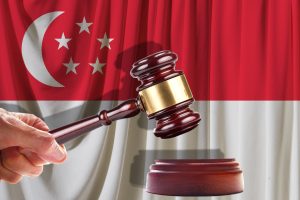A Singaporean court has announced eight new charges in the corruption case involving former Transport Minister S. Iswaran, alleging that he received valuable items, including golf clubs and whiskey, from Lum Kok Seng, a contractor who had dealings with the government.
In a hearing at the State Courts of Singapore on Monday, S. Iswaran pleaded not guilty to receiving 10 bottles of whisky, 12 bottles of wine, and other items including a luxury Brompton bicycle from Lum between November 2021 and November 2022, The Associated Press reported. The items were worth a total of nearly 19,000 Singapore dollars ($14,000), the Corrupt Practices Investigation Bureau said in a statement.
Lum is the managing director of Lum Chang Holdings, the parent company of Lum Chang Building Contractors, which has work contracts with the Singaporean government. The AP quoted the Attorney-General’s Chambers as saying it will decide whether to charge Lum after the case against Iswaran concludes.
A longtime member of the People’s Action Party (PAP), Iswaran played an important role in bringing Formula 1 racing to Singapore in 2008. He was appointed transport minister in 2021, and was arrested along with hotel tycoon Ong Beng Seng in July of last year. He tendered his resignation to Prime Minister Lee Hsien Loong in January.
The eight charges add to the 27 already announced on January 18, which included two counts of corruption under the Prevention of Corruption Act, one of obstructing justice, and 24 of obtaining valuables worth S$384,340 ($286,181) as a public servant under the Penal Code. Most of these involved tickets to exclusive events, including the Singapore Grand Prix, Premier League football matches, and West End theater productions, which he is alleged to have received from Ong, who was arrested along with Iswaran last July. Iswaran is accused of advancing Ong’s business interests in exchange for the gifts. Iswaran has pleaded not guilty to all 27 charges.
Corruption investigations, especially involving high-ranking government officials, are extremely rare in Singapore and Iswaran’s case marks the first time in nearly four decades that a cabinet minister has been investigated for such a transgression. The last took place in 1986, when Minister for National Development Teh Cheang Wan was accused of accepting around S$1 million in bribes but died of suicide before his case could come to trial.
The fact that Iswaran’s alleged transgressions are minor – the estimated $300,000 worth of “gratifications” that he is accused of obtaining is a tiny jot next to some of the region’s largest recent corruption scandals – speaks to the successes that the PAP has had in all but eliminating corruption. It has done this by offering generous remuneration to civil servants, competitive with private sector salaries, and correspondingly severe penalties for those abusing their power. The charge of “corruptly obtaining gratification” under the Prevention of Corruption Act carries up to seven years in prison, so if found guilty of all charges, Iswaran could conceivably spend the rest of his life behind bars.
The Iswaran case has the potential to embarrass the PAP government, which has long prided itself on clean governance, and has laid bare the cushy relationships among the city-state’s political and business elite. At the same time, it gives Prime Minister Lee’s administration the chance to make an example of Iswaran, and, ahead of a leadership transition in the PAP, renew the party’s reputation for unblemished and effective governance. For this reason alone, the former minister can expect little leniency.

































